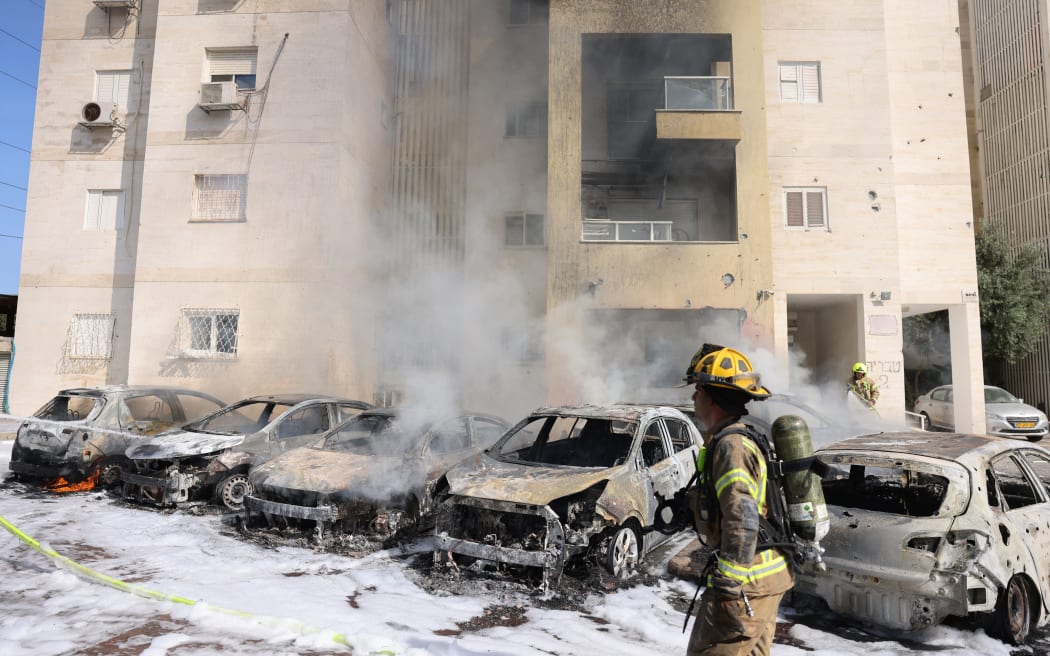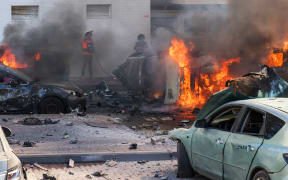
Israeli fire brigade teams douse the blaze in a parking lot outside a residential building following a rocket attack from the Gaza Strip. Photo: AHMAD GHARABLI / AFP
By Frank Gardner, BBC News
"We have no idea how this could have happened."
That is the reaction Israeli officials have been giving today when I ask them how, with all its vast resources, Israeli intelligence did not see this attack coming.
Dozens of armed Palestinian gunmen were able to cross the heavily fortified border between Israel and the Gaza Strip, while thousands of rockets were fired from Gaza into Israel.
With the combined efforts of Shin Bet, Israeli domestic intelligence, Mossad, its external spy agency and all the assets of the Israel Defense Forces, it is frankly astounding that nobody saw this coming.
Or if they did, they failed to act on it.
Israel has arguably the most extensive and well-funded intelligence services in the Middle East.
It has informants and agents inside Palestinian militant groups, as well as in Lebanon, Syria and elsewhere.
It has, in the past, carried out precisely timed assassinations of militant leaders, knowing all their movements intimately.
Sometimes these have been done with drone strikes, after agents have placed a GPS tracker on an individual's car; sometimes in the past it has even used exploding mobile phones.
On the ground, along the tense border fence between Gaza and Israel there are cameras, ground-motion sensors and regular army patrols.
The barbed-wire topped fence is supposed to have been a "smart barrier" to prevent exactly the sort of infiltration that has taken place in this attack.
Yet the militants of Hamas simply bulldozed their way through it, cut holes in the wire or entered Israel from the sea and by paraglider.
To prepare for and carry out such a coordinated, complex attack involving the stockpiling and firing of thousands of rockets, right under the noses of the Israelis, must have taken extraordinary levels of operational security by Hamas.
Not surprisingly, the Israeli media has been asking urgent questions of their country's military and political leaders as to how all this could have occurred, on the 50th anniversary of another surprise attack by Israel's enemies at the time: the Yom Kippur war of October 1973.
Israeli officials tell me a major investigation has begun and questions, they say, "will go on for years".
But right now Israel has more pressing priorities. It needs to contain and suppress the infiltration of its southern borders, removing those Hamas militants who have taken control of several communities on the Israeli side of the border fence.
It will need to address the issue of its own citizens who have been taken captive, either through an armed rescue mission or by negotiation.
It will try to eliminate the launch sites for all those rockets being fired into Israel, an almost impossible task of whack-a-mole as they can be launched from almost anywhere with little notice.
And perhaps the biggest worry for Israel is this: how does it stop others responding to Hamas's call to arms and avoid this conflagration spreading into the West Bank and possibly even draw in the heavily-armed fighters of Hezbollah across its northern border with Lebanon?
This story was originally published by the BBC.





